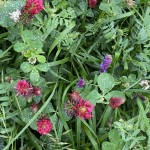Trust announces $3m project in Hastings
A six year Carbon Positive project, officially announced today, to investigate regenerative farming principles in NZ cropping systems. Led by Trust and LandWISE.
Added 2 years ago

A ground breaking study testing whether soil carbon can be regenerated – and to what extent – in soils used for intensive field cropping is underway in Hawke’s Bay.
In a first for the New Zealand cropping sector, the Carbon Positive project brings together central and Hawke’s Bay local government, vegetable growers and processors, and suppliers to the cropping industry.
“We’re committing more than $2 million over six years in Hawke’s Bay to help build up an evidence base on the application and effectiveness of regenerative farming in a typical intensive field cropping and arable system,” Agriculture Minister Damien O’Connor said.
Phil Schofield HBFFT chair and soil health specialist says the trial is an exciting opportunity to test whether soils used for intensive cropping can be regenerated.
“The potential of this project for New Zealand’s cropping farmers is huge. Through this study we will increase our understanding of the benefits of regenerative agriculture principles on intensive cropping systems.
“We are incredibly grateful for the support of our funding and collaboration partners. And delighted that our region’s largest food processors -- Kraft Heinz Watties NZ and McCain Foods NZ -- are involved and eager to help explore practices that can put our growers on a better footing environmentally and financially and make their systems more resilient in the face of climate change. Our test site will showcase alternative management systems that growers can adopt.”
LandWISE Manager Dan Bloomer says “We know cropping affects soil quality. The longer and more intensively used, the higher the likelihood that soil carbon levels have dropped, soil is compacted, and structure is more degraded. Competition for land intensifies cropping so we want to know if management changes can make a positive difference.”
“We’ve measured soil quality at our MicroFarm where the six year trial is taking place and after 8 – 10 years conventional cropping it is now in a fairly average condition. This trial will let us see if regenerative agriculture practices, which focus on strengthening the health and vitality of farm soil, have different outcomes compared to those from conventional cropping methods. We are also testing a hybrid system, taking aspects from both regen and conventional practice as a sort of half-way house.”

The project will examine soil carbon stocks, soil carbon cycling, soil health, crop yield, and farm economics, giving rigorous scientific assessments of environmental, productivity and profitability outcomes.
It will:
- Increase understanding of cost/benefits of alternative practices
- Illustrate possible conversion pathways
- Support development of decision making tools
- Increase knowledge of regenerative farming principles through the value chain.
The project weaves mātauranga Māori principles throughout its activities through a developing relationship with neighbouring Ruahapia Marae and guidance from ethnobotany Professor Nick Roskruge (Te Atiawa, Ngāti Tama).
Carbon Positive has commercial, science, and industry partners as follows:
Commercial partners – Heinz Wattie’s, McCain Foods, BASF, Hill Laboratories
Science partners – Ministry for Primary Industries, Plant & Food Research, Manaaki Whenua (Landcare Research), Massey University, AgResearch, Hawke’s Bay Regional Council
Industry partners – HB Vegetable Growers, Quorum Sense
The Hawke’s Bay Future Farming Trust is supported by Sponsors Bayleys Country, Napier Port, Hastings District Council and Hawke’s Bay Regional Council. Its purpose is to shine a light on Hawke’s Bay’s existing and emerging farming expertise, and create a local hub of knowledge, research, education and opportunity for profitable and resilient farming to ensure the health of the region’s soil and water, communities and farmers into the future.
The full statement of Minister O'Connor is here.
Join the conversation
Be the first to leave a comment.
Leave a comment
All comments are reviewed before they are published on the website. Your email address will not be published.




Family-Owned Farm Embraces Regenerative Agriculture to Grow and Educate


